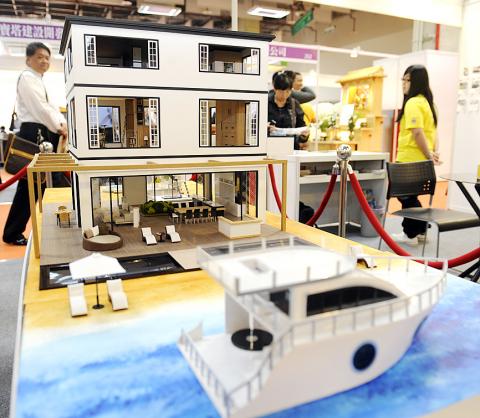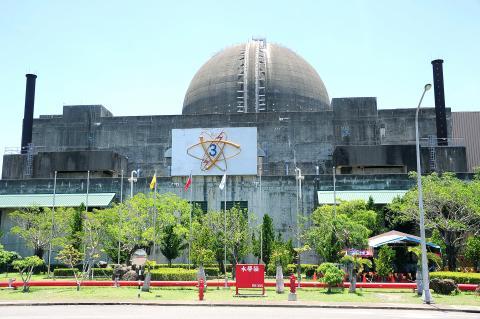From a modern summer villa with an outdoor pool to a fully equipped film studio or a casino, paper model makers in Taiwan are ensuring the dead enjoy an eternity of luxury.
Across the globe for ethnic Chinese, burning paper offerings has long been seen as a way to send ancestors gifts that they can use in the afterlife.
In recent years, traditional paper incarnations of money and gold bars have given way to the more modern — paper iPads and mobile phones, washing machines, cars, televisions and credit cards.

Photo: George Tsorng, Taipei Times
However, a handful of paper model makers in Taiwan are taking the art to a new level and crafting offerings that bestow on the dead the kind of trappings only experienced by the truly rich and famous in the land of the living.
“We believe that people will move on to another world after they die,” Taipei businessman Chen Shu-hsuan said, as he attended his uncle’s funeral.
Moments before, family members prayed as a detailed model of a two-story mansion created for the deceased went up in flames, complete with working lights, paper staff and a luxury car tucked away inside an attached garage.
“We hope he would live a good afterlife in that world so we prepared a paper house and a lot of paper money so he could have the means to live well,” Chen said.
The practice of burning offerings originated in Taoism, a leading faith in Taiwan, with the gifts primarily offered at funerals, death anniversaries and during key festivals when ancestors are honored.
Chen said his family intended to burn more offerings for his uncle at yesterday’s Tomb Sweeping Festival, when ethnic Chinese traditionally visit and tidy the graves of their ancestors to pay respect.
Model maker Lin Chien-chiang, 55, has been in the business for 30 years and said that consumer demands are becoming increasingly complex.
These include miniature banks, a space shuttle, and even an entertainment complex featuring a casino and a hostess club complete with ladies dressed in figure-hugging outfits.
His most popular offerings include realistic miniature gadgets, such as smartphones and laptops, and a “mini vault” containing a wad of US dollars, gold bars and credit cards.
Lin’s company is also one of a handful in Taipei that still manufacture bigger, traditional Chinese-style houses made with paper and bamboo, but they fell out of fashion because of environmental concerns, as they used to contain styrofoam.
“We are making changes to produce smaller and more intricate models to better suit the times. And using more environmentally friendly materials,” Lin said, adding that fewer than 20 percent of his orders now are for traditional houses.
Veteran craftsman Chiang Yueh-lun, 51, recalled his most unique order: A lifesize paper double of a young man killed in a car crash to be placed on top of the badly damaged body inside his casket.
“Some people think our business is bad luck because it has to do with the dead, but I believe we are accumulating good karma for the services we provide,” he said.
Han Ye-an, 40, started her business after she could not find an ideal paper house for her grandfather when he passed away 12 years ago. She eventually made a paper villa with an outdoor hot spring that her grandfather had loved.
Han believes that the offerings not only serve as a tribute to the deceased, but also help the living cope with loss.
“We can continue to express our love,” Han said of the paper gifts, adding: “We are not forgetting our loved ones and they are living in our hearts.”
Han offers a variety of handcrafted everyday items, such as paper clothes, bags and cosmetics priced from about NT$100.
At the other end of the spectrum, the price tag can be steep.
She once built an elaborate film-studio boasting sets from different time periods for the family of a deceased entertainment tycoon. The bill came to US$64,000.
The tradition has crossed over into Taiwan’s other faiths. Han estimates 20 percent of her customers are Christian.
She is to display some of her designs at an exhibition on Taiwan’s funeral culture in Paris from June, including a dim sum restaurant based on a product she previously made for a customer.
“I hope Western societies will understand our practice,” she said. “Paper offerings are not something scary. I want to make beautiful items that make people feel their loved ones are living a better life in heaven.”

A fugitive in a suspected cosmetic surgery fraud case today returned to Taiwan from Canada, after being wanted for six years. Internet celebrity Su Chen-tuan (蘇陳端), known as Lady Nai Nai (貴婦奈奈), and her former boyfriend, plastic surgeon Paul Huang (黃博健), allegedly defrauded clients and friends of about NT$1 billion (US$30.66 million). Su was put on a wanted list in 2019 when she lived in Toronto, Canada, after failing to respond to subpoenas and arrest warrants from the Taipei District Prosecutors’ Office. Su arrived at Taiwan Taoyuan International Airport at 5am today on an EVA Air flight accompanied by a

An essay competition jointly organized by a local writing society and a publisher affiliated with the Chinese Communist Party (CCP) might have contravened the Act Governing Relations Between the People of the Taiwan Area and the Mainland Area (臺灣地區與大陸地區人民關係條例), the Mainland Affairs Council (MAC) said on Thursday. “In this case, the partner organization is clearly an agency under the CCP’s Fujian Provincial Committee,” MAC Deputy Minister and spokesperson Liang Wen-chieh (梁文傑) said at a news briefing in Taipei. “It also involves bringing Taiwanese students to China with all-expenses-paid arrangements to attend award ceremonies and camps,” Liang said. Those two “characteristics” are typically sufficient

A magnitude 5.9 earthquake that struck about 33km off the coast of Hualien City was the "main shock" in a series of quakes in the area, with aftershocks expected over the next three days, the Central Weather Administration (CWA) said yesterday. Prior to the magnitude 5.9 quake shaking most of Taiwan at 6:53pm yesterday, six other earthquakes stronger than a magnitude of 4, starting with a magnitude 5.5 quake at 6:09pm, occurred in the area. CWA Seismological Center Director Wu Chien-fu (吳健富) confirmed that the quakes were all part of the same series and that the magnitude 5.5 temblor was

Restarting the No. 2 reactor at the Ma-anshan Nuclear Power Plant would take up to 18 months, Minister of Economic Affairs J.W. Kuo (郭智輝) said today. Kuo was answering questions during a meeting of the Legislative Yuan’s Economics Committee, where legislators are considering amendments to the Renewable Energy Development Act (再生能源發展條) amid concerns about the consequences of the Pingtung County reactor’s decommissioning scheduled for May 17. Its decommissioning is to mark the end of Taiwan’s nuclear power production. However, Chinese Nationalist Party (KMT) lawmakers have proposed an amendment to the Nuclear Reactor Facilities Regulation Act (核子反應器設施管制法) that would extend the life of existing